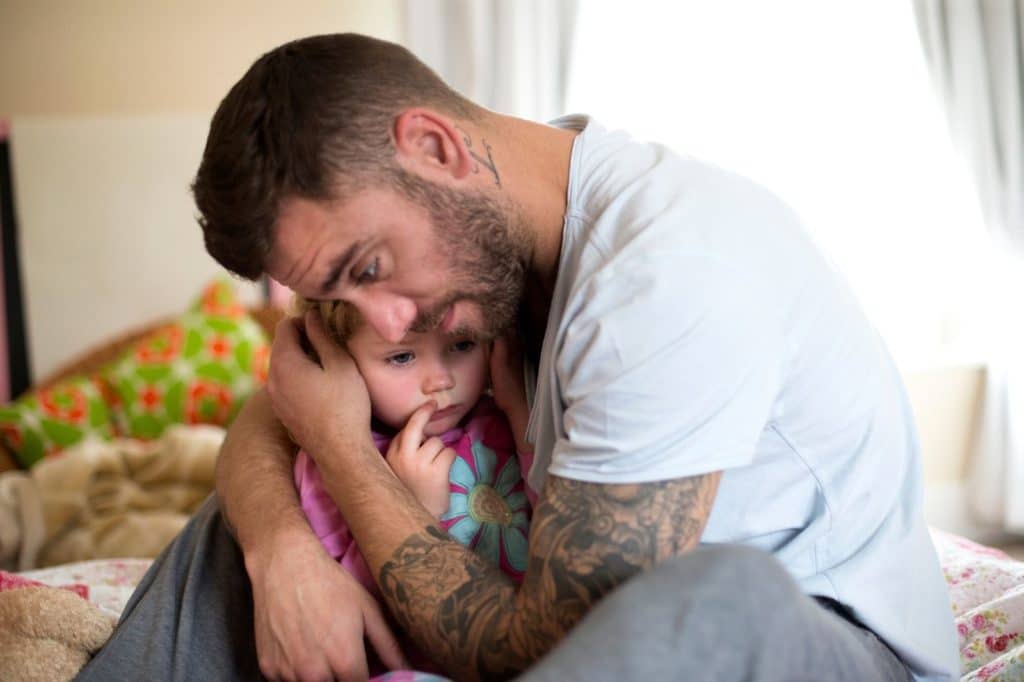When a child is injured or traumatized in some way, it’s not unusual for the parents to also experience some emotional impact from the trauma. This is called secondary traumatic stress, or STS, and it’s a form of persistent emotional distress that comes from dealing with your child’s trauma firsthand. STS is more than just feeling burnt out; its signs and symptoms are similar to posttraumatic stress. And parents with their own history of trauma can be especially vulnerable to STS.
What can cause STS? It might come from:
- Hearing your child tell a story about their trauma
- Viewing your child’s drawings or reading their written stories about the trauma
- Seeing your child’s reactions to trauma reminders
- Witnessing your child act out the trauma
- Watching media coverage, case reports, or other documents about the type of trauma your child experienced
Some signs and symptoms of STS include:
- Thinking about or having imagery of your child’s trauma story over and over
- Increased anxiety or concerns about the safety of yourself or your child
- Feeling fatigued or having low energy
- Feeling powerless
- Feeling fewer positive emotions or empathy, or even feeling numb
- Problems concentrating or difficulty making decisions
- Reduced interest in things you previously enjoyed
- Withdrawing from friends, family or coworkers
- Difficulty sleeping or having distressing dreams related to a child’s trauma story
As a parent of a child who has experienced trauma, the potential of developing STS is real. Fortunately, there are ways that you can lower your risks.
Practice Self-Reflection
It can be hard to admit that you feel burnt out or emotionally impacted by the stress of your child’s injury or trauma. And you might be so busy that you don’t take the time to notice how you are feeling. An important part of preventing STS is knowing the signs and paying attention to your mind and body.
Take a minute or so to “check in” with yourself each day. Notice any changes in your emotional well-being, and ask yourself if it may be related to what your child is going through. It’s important to know that STS reactions are not a sign of weakness. Instead, being aware of them is a sign of emotional maturity and strength.
Consult and Talk With Trusted Others for Support
As a trauma therapist myself, one of the most important things I’ve learned is how helpful it is to talk with others about your experiences. Sometimes, the purpose of talking to others isn’t to ask for specific advice. It’s an opportunity to share and process your experience with someone you trust who can understand, give support, and offer their perspective.
Finding professional support from a therapist or counselor who specializes in trauma can also be very helpful and healing. Consider this option if you notice yourself experiencing any of the symptoms described above.
Practice Self-Care
I cannot stress enough the importance of self-care. Self-care can mean so many things, and there are multiple areas of self-care, such as physical, emotional, spiritual, recreational, and educational. Most people find that a having balance of different areas works best. For example:
- Physical — Getting enough sleep, taking prescribed medications, regular exercise, eating nutritional food
- Emotional — Talking to a trusted friend or family member, journaling, talking with a therapist
- Spiritual — Praying, going to your place of worship, meditating
- Recreational — Watching a favorite show, reading, arts and crafts, playing a game with friends, gardening
- Educational — Watching a documentary on an interesting subject, professional training in an area you are passionate about
If you notice any of the signs or symptoms of STS, don’t ignore them. Seek support immediately. The healthier you are as a parent, the better you will be for your child. Remember, you can’t pour from an empty cup.










